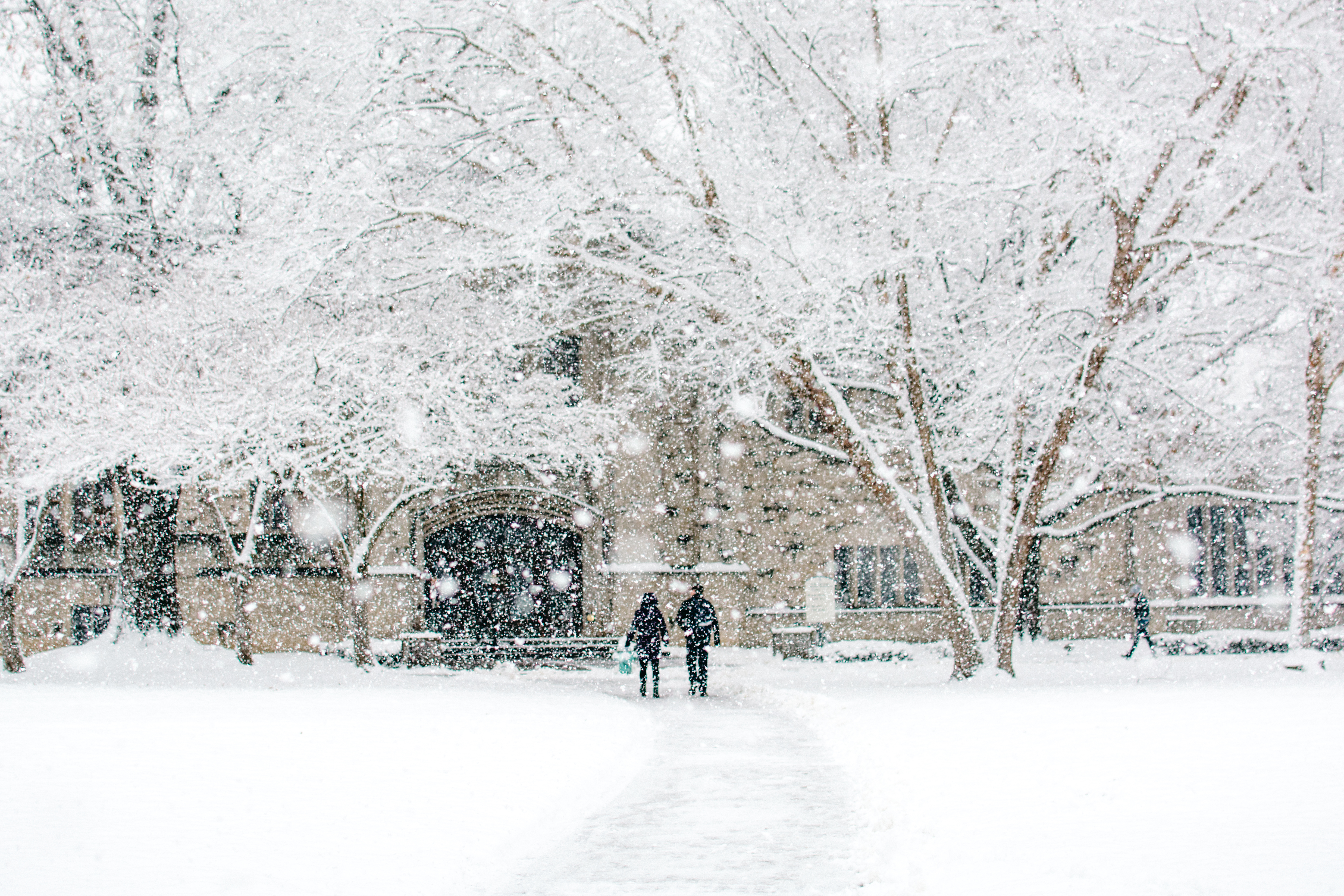Winter weather will impact outdoor classes and activities this semester. Collegian File photo.
SOPHIE CIOKAJLO | STAFF REPORTER | sciokajl@butler.edu
As the weather gets colder in Indiana, Atherton Mall, normally busy with students studying and spending time with friends, slowly drains of its usual crowd; students opt for the library, leaving empty Starbucks tables in their wake.
Winter is looming on the horizon, but this year, the COVID-19 pandemic is another factor impacting student behavior. In order to stay safe, many students have been eating, studying, and hanging out outdoors.
SGA has also organized several outdoor, socially-distanced events on the Clowes Hall lawn and the lawn between Atherton and ResCo. Butler University Dance Marathon has also held events on Atherton Mall and student-athletes organized an outdoor campus protest in support of Black Lives Matter.
Meghana Bendre, a junior dance performance major, has been eating her lunch outside because of COVID-19.
“I’ve seen studies and just heard news stories that COVID travels more easily indoors and it’s safer to try to ventilate the indoors and spend time outdoors,” Bendre said. “It makes me feel much safer to just opt for outdoor activities when I choose to leave my apartment.”
But how will students stay safe and comfortable when winter temperatures hit?
Bendre said she doesn’t have enough time in between dance classes to walk home, and will therefore just have to eat inside during the winter. Over 100 dance majors, a multitude of other departments in Lilly Hall and faculty members can make for crowded hallways. Of course other campus locations like Starbucks and the business building are available for students to eat in, but each space brings with it a variety of new people to potentially come into contact with.
Beyond students choosing to partake in outdoor activities, some classes are currently being held outdoors for social distancing purposes. The musical school in particular has been taking advantage of the fair weather; all choir rehearsals are being held outdoors, for example, since singing results in increased aerosol production and, therefore, germs.
Eric Stark, director of choral activities, said all of the faculty members that direct choirs decided together that outdoor rehearsals would be safest.
“We’ve been paying very close attention to a number of scientific studies that are ongoing, looking at potential rates of transmission for all kinds of situations, but especially for singers, because of the way that singers use breath, we’re sometimes called ‘super spreaders,’” Stark said. “It’s something that we take very seriously and we want to make sure we’re protecting our students.”
Sophie Strasheim, a senior music education and vocal performance double major, said the transition has been hard, but rehearsals are going well. She said the biggest challenge has been hearing fellow choir members while practicing.
“This week we started rehearsing in the parking garage, which is really helpful because, while it’s still outside, there’s more walls for the sound to bounce off of,” Strasheim said. “If we were standing, for example, outside of the observatory, if you’re 40 feet away from the farthest person in the ensemble it’s really hard to feel like you’re actually singing together.”
In addition to rehearsing outdoors, choir classes have also been doing some virtual activities.
Antony Winfrey, a senior music education and vocal performance major, said the non-singing activities have been just as beneficial.
“Every Friday we’ve been doing this collaborative community choir thing and it’s virtual, but it’s still really informative,” Winfrey said. “We have choirs from a middle school, some elementary school choirs might zoom in, and then choirs from Sao Paulo, Brazil.”
Stark said the faculty do not plan on adjusting the outdoor choir rehearsal model this semester.
“What we’ve said so far is that we’re going to follow this plan through the end of the semester,” Stark said. “We’ve made it halfway and obviously the weather will change and get colder, but we don’t have space available to put the whole choir safely indoors and sing.”
Stark said he is hoping larger spaces such as Clowes Memorial Hall and Hinkle Fieldhouse might be available for choir rehearsals next semester.
Even if choir practice finds a way to move indoors safely, students trying to eat, study or spend time with friends will not have the luxury of access to large spaces.
Bendre said she’s unsure if COVID-19 will encourage people to remain outdoors even when it’s colder.
“I feel like people studied outside and ate outside in years prior and I’m not sure that they’re doing it now because of COVID like I am,” Bendre said. “I don’t think that people will be as cognizant of trying to be outside rather than indoors in larger groups once it gets colder.”



